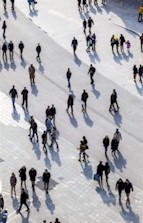
Well, at least today we have our wide-screen TVs and laptops and notebooks and smart phones and assorted other devices to make us happy—right?
Actually, no. On balance, this isn’t the effect they end up having. More often than not, they make us more unhappy. This problem extends far beyond teenagers traumatized by social media.
We’ve evolved into a society where everything important seems to take place on the other side of a screen. The people who appear to inhabit this realm are the ones who most of us unquestioningly regard as the most significant.
Television brought their moving and speaking images into our homes on a daily basis; wide screens have made their faces as big as our own or bigger; small portable devices have made them omnipresent. And with the media probing endlessly into the personal details of celebrities’ lives, it’s easy to get the impression that we actually know them. This can take the edge off the sense of invisibility that’s become common in a world where not even our neighbors know us.
Keeping current on the ups and downs and assorted peccadillos of famous people’s lives can enable us to feel like insiders at a royal court, where it doesn’t matter that we don’t know all the faceless peasants scurrying through the streets, since we’re close to the aristocrats around whom the world really revolves.
But since the vast majority of us will never be seen as glowing images on a screen ourselves (except for a few trifles we may post on social media), how significant could we be?
The more lasting effect of our fascination with “big name” and “A-list” people has thus been to establish a psychological equivalent of the old feudal order—with a “celebritocracy” occupying the upper reaches of society in the manner of the old aristocrats, and all the rest of us relegated to the status of inconsequential serfs.
Having large numbers of people feel invisible and/or inconsequential tends not to bode well for a society.


